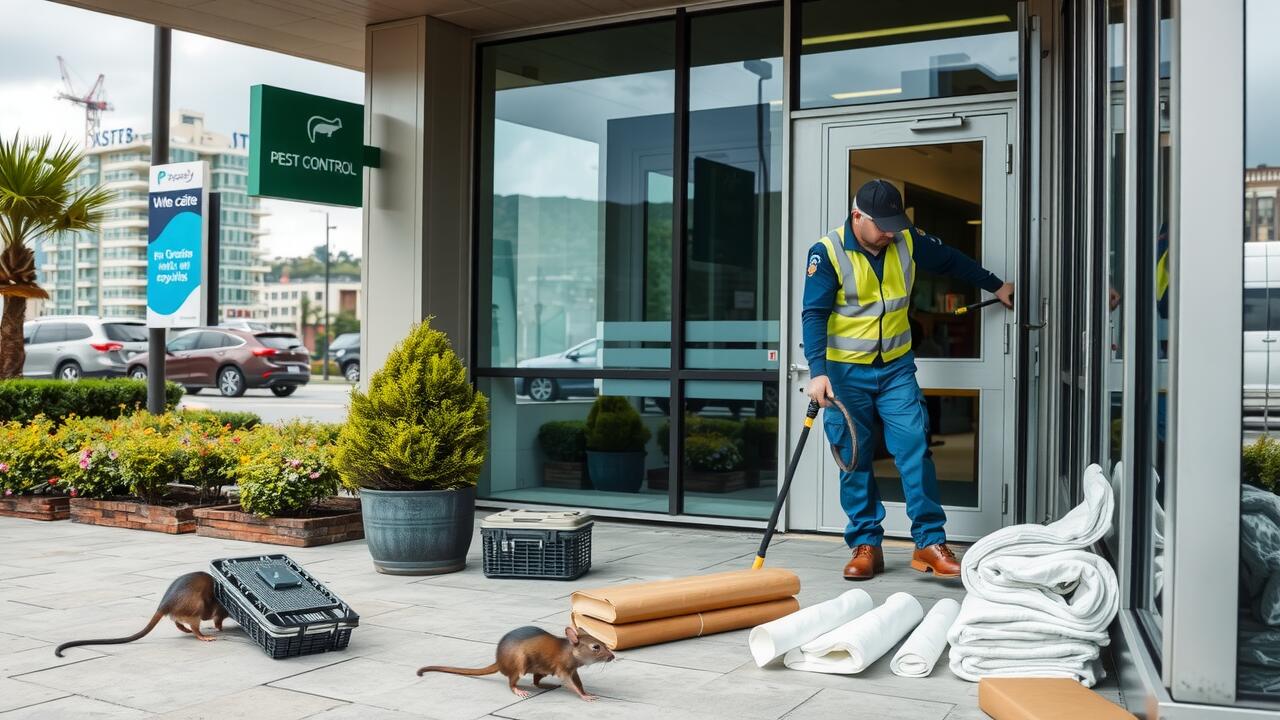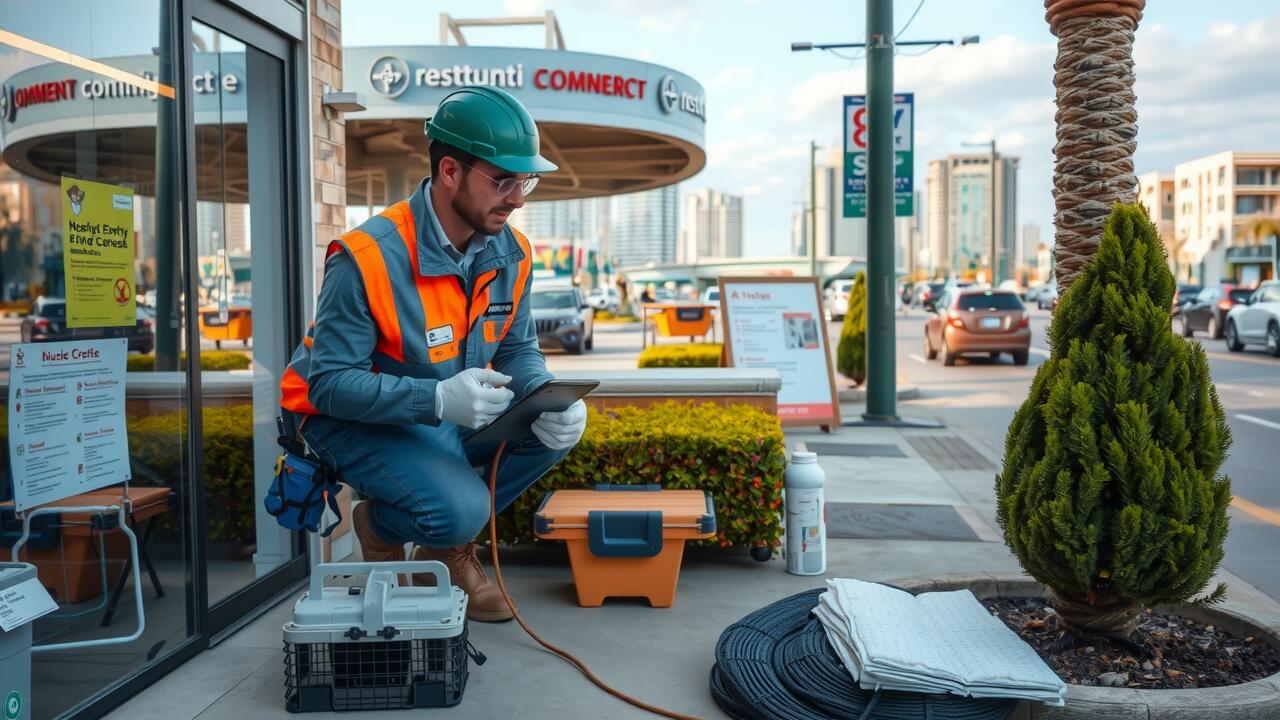
Implementing Sanitation Measures
Effective sanitation measures play a crucial role in preventing rodent infestations in commercial spaces. Regularly cleaning areas where food preparation and storage occur significantly reduces the availability of resources that attract rodents. Ensuring that surfaces are free from crumbs and spills can deter pests from establishing a presence. Additionally, maintaining proper waste management practices, such as using sturdy, sealed containers for garbage, minimizes the chances of rodents finding easy access to food supplies.
In Brookshire, Texas, businesses can adopt specific sanitation strategies tailored to their operational environments. Training employees on the importance of cleanliness and organizing routine cleaning schedules can enhance efforts. Implementing strict protocols for food safety and waste disposal is vital. Frequency of deep cleaning should be increased in high-risk areas, such as kitchens and stockrooms, where food is handled frequently. These proactive measures contribute significantly to the overall success of commercial rodent exclusions in Brookshire, Texas.
Best Practices for Cleanliness
Maintaining a clean environment is crucial for deterring rodents in commercial spaces. Regular cleaning schedules should be established to ensure all areas are thoroughly cleaned, focusing on potential nesting sites and food sources. Clear away any debris, such as loose packaging materials, which may attract pests. Keeping storage areas organized and free of clutter will eliminate hiding spots and make it easier to identify any signs of rodent activity.
Incorporating best practices for cleanliness also includes proper food handling and disposal. Ensure all food products are stored in sealed containers and regularly inspect these areas to prevent spills and crumbs. Trash receptacles should be kept tightly covered and emptied frequently. Implementing these cleanliness measures is essential for effective Commercial Rodent Exclusions in Brookshire, Texas, helping to create an environment that is less hospitable for unwanted pests.
Regular Maintenance and Monitoring
Regular maintenance and monitoring play crucial roles in effective rodent exclusion strategies. Regular inspections help identify potential entry points and areas where rodent activity may occur. Businesses should establish a routine schedule for these inspections. Keeping the premises clean and organized during these check-ups further facilitates the identification of any issues.
In Brookshire, Texas, companies can benefit from tailored approaches to commercial rodent exclusions. Collaboration with pest management services ensures that businesses adhere to local guidelines and best practices. This partnership not only improves the effectiveness of exclusion efforts but also reinforces ongoing monitoring to maintain a rodent-free environment.
Setting Up Visual Inspections
Regular visual inspections are essential for identifying potential rodent entry points and signs of activity in commercial spaces. Establishing a clear inspection schedule can help staff maintain vigilance. Inspectors should focus on common areas such as storage rooms, break rooms, and loading docks. By examining these spaces, organizations can promptly address any weaknesses in their defenses, thereby reducing the risk of rodent infestations.
In Brookshire, Texas, implementing a systematic approach to inspections is particularly crucial due to the region’s climate, which can encourage rodent activity. Personnel should be trained to recognize droppings, nesting materials, and gnaw marks that may indicate a problem. Utilizing checklists during these inspections can ensure that no area is overlooked, allowing for efficient documentation and follow-up. This proactive strategy is key to reinforcing measures for Commercial Rodent Exclusions in Brookshire, Texas.
Educating Staff on Rodent Awareness
Educating staff about rodent awareness is crucial for maintaining an effective pest control strategy. Employees should understand the signs of rodent activity, such as droppings, gnaw marks, and nesting materials. Regular training sessions can help reinforce these concepts, ensuring that all team members recognize potential threats quickly and report them. This proactive approach is essential for creating a responsive environment where infestations can be dealt with promptly.
In addition to recognizing signs of rodent activity, staff should be trained on the importance of maintaining cleanliness and proper food storage. Teaching employees about the role they play in pest management can foster a collective sense of responsibility. Commercial Rodent Exclusions in Brookshire, Texas, emphasizes the need for every employee to be vigilant, as even small lapses in hygiene can create vulnerabilities. Engaging employees in discussions about pest control can help build a culture of awareness and preparedness.
Training Programs for Employees
Training employees on rodent awareness is crucial for maintaining a rodent-free environment in any commercial space. Programs should focus on identifying signs of rodent activity, understanding how rodents gain entry, and recognizing potential health risks associated with infestations. Regular training sessions create a culture of vigilance among staff members, ensuring they are equipped to spot and report issues promptly. Including information specific to local challenges, such as those related to commercial rodent exclusions in Brookshire, Texas, enhances the relevance of the training.
In addition to initial training, ongoing education is essential for sustaining awareness among employees. Workshops or refresher courses can keep staff updated on the latest best practices and technologies for rodent exclusion. Utilizing visual aids and providing real-life scenarios will help reinforce concepts taught during training. By fostering a knowledgeable workforce, organizations can significantly reduce the risk of rodent problems and promote a healthier work environment.
FAQS
What are the key sanitation measures to implement for rodent exclusion in commercial spaces?
Key sanitation measures include regular cleaning of food preparation areas, proper waste disposal, sealing food containers, and maintaining a clutter-free environment to reduce potential rodent habitats.
How often should visual inspections for rodent activity be conducted in commercial spaces?
Visual inspections should be conducted at least monthly, but more frequent inspections are recommended for high-risk areas or after any changes in operations that might attract rodents.
What are some best practices for training employees on rodent awareness?
Best practices for training employees include providing clear information on recognizing signs of rodent activity, emphasizing the importance of sanitation measures, and conducting regular training sessions to keep staff informed about updates and protocols.
Why is regular maintenance important for rodent exclusion?
Regular maintenance is crucial as it helps identify and seal potential entry points, ensures the integrity of sanitation measures, and keeps the overall environment less attractive to rodents.
What should I do if I discover signs of rodent activity in my commercial space?
If you discover signs of rodent activity, it’s important to act quickly by contacting a professional pest control service, ensuring immediate sanitation measures are taken, and reviewing your rodent exclusion practices to prevent future issues.
